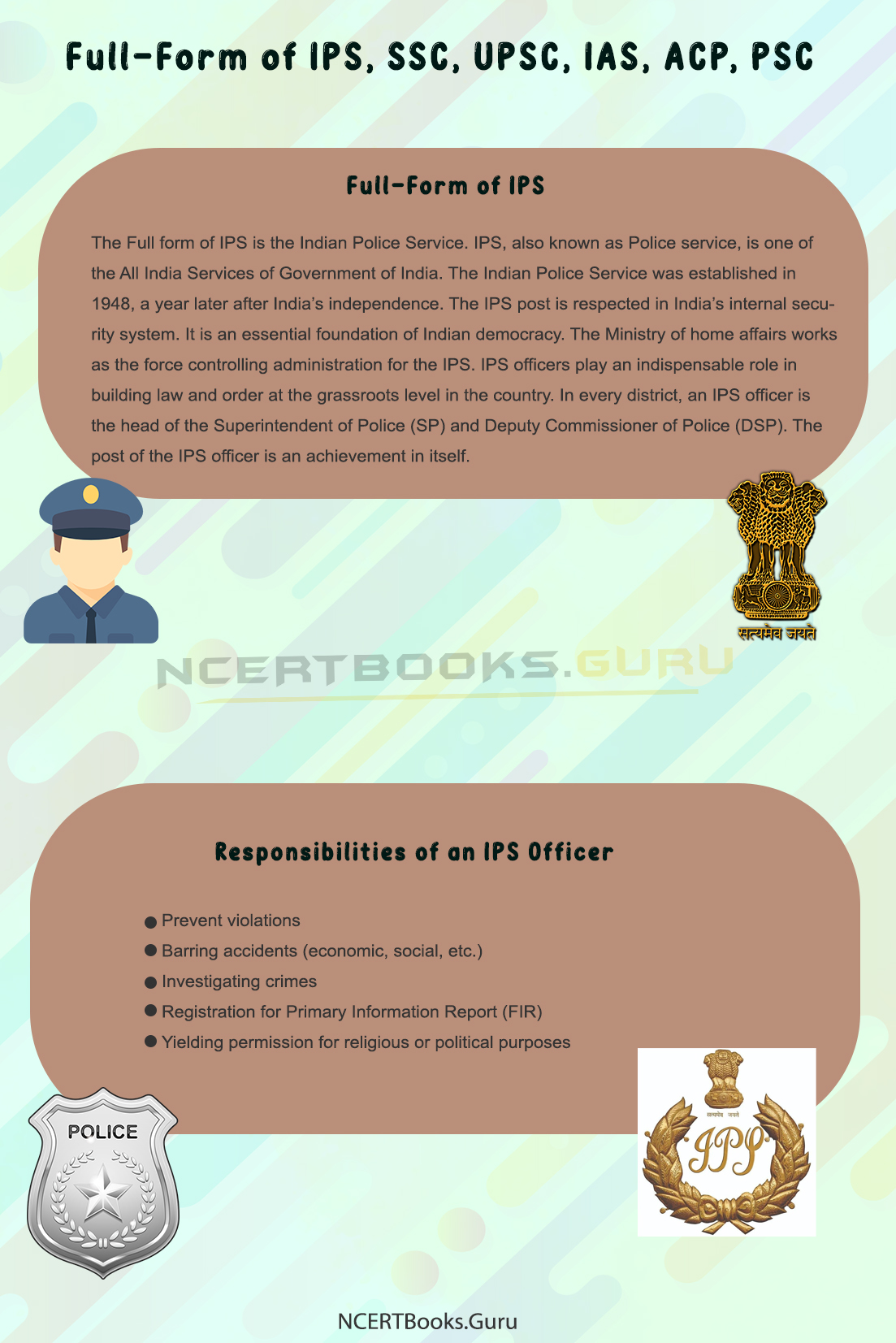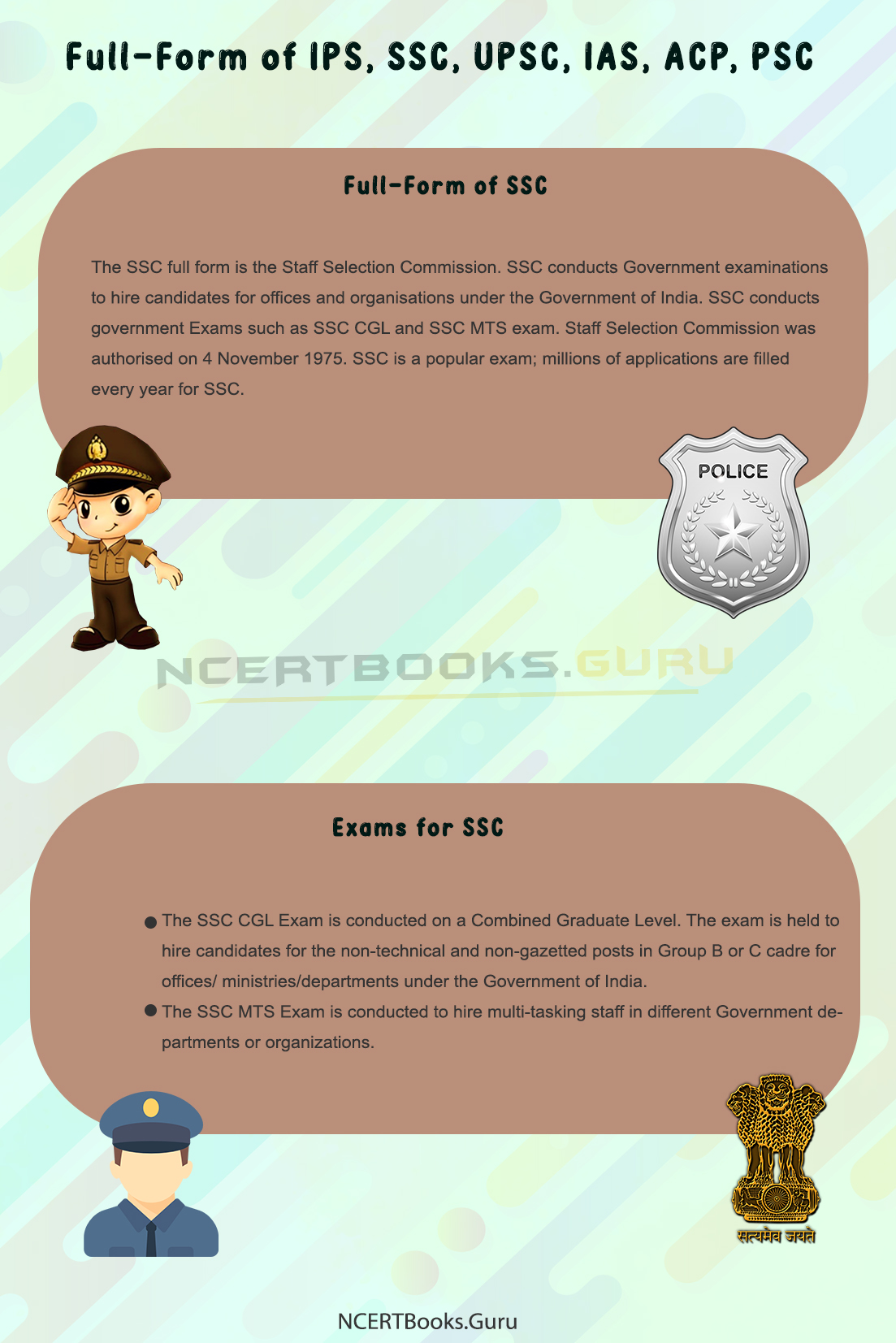Full-Form of IPS, SSC, UPSC, IAS, ACP, PSC: One of the most desired jobs in India is SSC, IFS, IAS, IPS, PCS, UPSC. Almost every student desires to join one of these services mentioned above as they are incredibly decent jobs in India. They pay a handsome payroll and the perks to be young and brilliant candidates who aspire to assist the nation. Here we will mention some details which will help you to know the Indian Services. Through these articles, the reader will learn about the higher post in India, which represents our nation.
SSC is the method of staff selection, UPSC is a government body which manages the civil services exams, IPS is related to police service, ACP is a classification in the police station, PSC is a government body which administers exams to hire state-level government officers. These labels and services are prestigious and perform a crucial role in the governance of the largest democracy in the world.
Get to Know More about other types of Course Details in Stream wise, and Category wise.
Full-Form of IPS, SSC, UPSC, IAS, ACP, PSC Course Highlight
- The full form of SSC, IFS, IAS, IPS, PCS, UPSC
- Responsibilities
- Skills required for the course
- Syllabus of the course
- Entrance Examinations for admissions
- Fee Structure of the course
- Career options after completing the course
- Expected salary
Full-Form of IPS
The Full form of IPS is the Indian Police Service. IPS, also known as Police service, is one of the All India Services of Government of India. The Indian Police Service was established in 1948, a year later after India’s independence. The IPS post is respected in India’s internal security system. It is an essential foundation of Indian democracy. The Ministry of home affairs works as the force controlling administration for the IPS. IPS officers play an indispensable role in building law and order at the grassroots level in the country. In every district, an IPS officer is the head of the Superintendent of Police (SP) and Deputy Commissioner of Police (DSP). The post of the IPS officer is an achievement in itself.
Responsibilities of an IPS Officer
- Prevent violations
- Barring accidents (economic, social, etc.)
- Investigating crimes
- Registration for Primary Information Report (FIR)
- Yielding permission for religious or political purposes.

Eligibility Criteria
- Applicants from India, Bhutan and Nepal can give the IPS exam.
- Graduation in any relevant course
- Candidate age should be between 21-30 years. Reserved category candidates get a five-year privilege.
Physical Ability
- Male candidates should be 165 centimeters, and female candidates should be 150 cm.
- SC / OBC male candidates of 160 cm and female candidates 145 cm can also apply.
- The male chest should be 84 centimeters, and females should have 79 cm.
- A healthy vision with a power of 6/6 or 6/9 is needed. The optics of weak eyes should be 6/12 or 6/9.
Exams for IPS
There are three stages for the IPS exam.
- Preliminary (Prelims)
- Main exam
- Interview.
Preliminary Exams (Prelims)
In the initial exam there are two sets of paper :
- Paper I: This paper is of 200 marks and covers Indian History, National and International Current Affairs, Indian National Movement, Geography of India and the World, Political System, Panchayati Raj, Public, Economic and Social Development, Indian Monarchy and Governance, Environmental Ecology, Biodiversity, Climate Change and General Science. The time limit for completing this paper is 2 hours.
- Paper-II: This paper also consists of 200 marks asks questions related to comprehension, logical reasoning, interpersonal skills, and analytical ability, decision making and problem-solving and data interpretation (charts, graphs, tables). The time limit for the paper is also 2 hours.
Main Examination: The main exam of civil services consists of written tests. The test consists of 9 papers in total, in which Set A and B are for qualifying, and the other seven papers are for merit.
Interview: Applicants are called for a personal interview round after the main exam. This interview is for 45 minutes.
Job and Salary
| Designation | Salary | Grade Pay |
| Director-General of Police | 80,000 | – |
| Special Commissioner of Police | Rs 37,400 | 12,000 |
| Inspector-General of Police | 37,400 – 67,000 | 10,000 |
| Deputy Inspector General of Police | 37,400 – 67,000 | 8,900 |
| Senior Superintendent of Police | 15,600 – 39,100 | 8,700 |
| Additional Deputy Commissioner of Police | 15,600 – 39,000 | 6,600 |
| Superintendent of Police or Deputy Commissioner | 15,600 – 39,000 | 7,600 |
| Deputy Superintendent of Police/ Assistant Commissioner of Police | 15,600 – 39,100 | 5,400 |
Full-Form of SSC
The SSC full form is the Staff Selection Commission. SSC conducts Government examinations to hire candidates for offices and organisations under the Government of India. SSC conducts government Exams such as SSC CGL and SSC MTS exam. Staff Selection Commission was authorised on 4 November 1975. SSC is a popular exam; millions of applications are filled every year for SSC.
Eligibility
- Graduation in any relevant course
- The applicant’s age must be between 18 and 32 years. The candidate’s age may vary according to the post.
- Class 10 or 12 students can also apply.
Physical Ability
- The chest requirement is 81 cm, with the least expansion of 5 cm for the male candidates. 5cm of relaxation is given to the Gorkhas, Garhwali, Assamese, and the Scheduled Tribes Candidates.
- The weight of the female candidates should be 48 kg, and a relaxation of 2 kgs for Garhwali, Assamese, Gorkhas and the Scheduled Tribes candidates.
- The male applicant should cover 1600 meters in 15 minutes, and the female candidate should cover 1000 meters in 15 minutes.
- The height of the male should be 165 cm, and for the female candidate, it should be 150 cm. The Hill and Tribal candidates have a relaxation up to 5 cms.
Exams for SSC
- The SSC CGL Exam is conducted on a Combined Graduate Level. The exam is held to hire candidates for the non-technical and non-gazetted posts in Group B or C cadre for offices/ ministries/departments under the Government of India.
- The SSC MTS Exam is conducted to hire multi-tasking staff in different Government departments or organizations.

Jobs
- Assistants
- Customs Examiner
- Multi-tasking Staff
- Junior Clerks
- Income Tax Inspectors
- Sub-Inspectors in Narcotics and more.
Full form of UPSC
The full form of UPSC is Union Public Service Commission. It is India’s top-level central government agency that administers many exams to hire officers and staff into various jobs of the central government.
The Public Service Commission (PSC) was renamed as Union Public Service Commission after independence in 1950 and extended its rights. Its primary purpose is to select first and second class officers or civil servants. Apart from IAS or IPS, many other Grade A and B officers are hired through UPSC.
Eligibility
- Graduation in any relevant course
- The candidate should be between 18 and 32 years. The candidate’s age may vary according to the post.
Exams for UPSC
The UPSC exam pattern is outlined to examine the academic expertise of the candidates as well as the ability of the applicant to present themself orderly and coherently.
The UPSC Exam is conducted in two stages
- Preliminary
- Main Examinations
Preliminary Exam
The prelims exam consists of two objective type question papers of 200 marks each. The question papers are set in both Hindi and English.
Main Examination
The UPSC main examination consists of 2025 marks. Candidates who qualify the Prelims exams are allowed to give the main exam.
Some of the examinations conducted by UPSC are :
- Engineering Services Examination (ESE)
- Combined Defense Service Exam (CDSE)
- Civil Service Examination (CSE)
- National Defense Examination (NDA)
- Indian Forest Service (IFS)
UPSC Civil Services Examination (CSE)
Eligibility Criteria – Graduation in any relevant course
- ESE (Engineering Services Examination): The ESE examination is conducted for the roads, manufacturing, railway and power.
- Combined Defense Services Examination (CDSE): The CDSE is conducted for Indian Military Academy, Indian Air Force Academy and Indian Naval Academy officers. It is conducted twice a year. Only unmarried students can apply for the examination and should have a graduation degree.
- National Defense Academy Examination (NDA): The NDA exam is conducted twice a year. The student must pass the 10+2 exam, and only unmarried can apply for the exam.
- Indian Forest Services Exam (IFSE): Graduation in any relevant course
Full-Form of IAS
The IAS exam was founded in 1858 by the name of the Imperial Civil Service. Later the exam name was changed to Indian Administrative Service. The Full form of IAS is Indian Administrative Service. After passing the IAS exam, the applicant can work under the Union Government or State Government.
Eligibility
- Applicants from India, Bhutan and Nepal can give the IAS exam.
- Tibetan refugee who arrived in India before 1st January 1962, can also apply
- candidate need to be between 21 to 32 years
- Graduate degree from a recognised institution
- Six attempts are only allowed to clear the exam.
Exams for IAS Exam
The exam pattern is planned to examine the academic expertise of the candidates.
- The IAS preliminary exam consists of 2 papers of 200 marks each.
- The main exam consists of 2025 marks. Candidates who qualify the Prelims exams are allowed to give the main exam.
Jobs
| Position in the State Government or Central government | Grade | Pay Scale |
| Cabinet Secretary of India | Cabinet Secretary Grade | Rs 90,000 |
| Chief development officer | Senior time scale | Rs15,600-Rs 39,100+ 6600 grade pay |
| Chief secretary of states | Apex Scale | Rs 80,000 |
| Sub-divisional magistrate in a sub-division of a district (entry) | Junior time scale | Rs 15,600-Rs 39,100 + Rs 5400 grade pay |
Full-Form of ACP
The full form of ACP is the Assistant Commissioner of Police. ACP is one of the putative posts of Indian Police Services. The position is given to the Assistant Superintendent of Police (Asst.SP) or Deputy Superintendent of Police (DSP) officer. One can become an ACP by serving in the police department for 15 -20 years or by getting directly by giving the UPSC exam and seizing a good rank.
Duties of an ACP
- The ACP performs the activities and tasks consigned by the Commissioner of Police.
- He or she has to manage and guide the officers under their authority and maintain the discipline of the department and pay regular visits to the police stations.
Full-Form of PSC
The full form of PSC is the Public Service Commission. It is a central administration that is liable for managing the recruitment examinations for jobs under different categories. Public Service Commission was organised under Article 315 to 323 of the Constitution of India.
The PSC was installed in 1935 at the provincial level by the Government of India Act. It is known as the State Public Service Commission. The State Public Service Commission is an autonomous constitutional body. It is specified in Part-14 of the Constitution between Articles 315 to 323, its independence, work, and powers, etc.
PSC Eligibility
- The candidate should have a Graduate Degree or a Post Graduate or Diploma in a related discipline.
- The age of the candidate should be between 18 to 33 years.
- The selection process consists of three stages such as Preliminary Examination, Main Examination, and Personal Interview.
PSC Exams
There are three stages for the PSC exam.
- Preliminary (Prelims)
- Main exam
- Interview.
Some of the Public Service Commissions in India are
- Union Public Service Commission
- Andhra Pradesh Public Service Commission
- Arunachal Pradesh Public Service Commission
- Assam Public Service Commission
- Bihar Public Service Commission
- Chhattisgarh Public Service Commission
- Goa Public Service Commission
- Gujarat Public Service Commission
- Haryana Public Service Commission
- Karnataka Public Service Commission
- Kerala Public Service Commission
- Madhya Pradesh Public Service Commission
- Maharashtra Public Service Commission
- Manipur Public Service Commission
- Meghalaya Public Service Commission
- Mizoram Public Service Commission
- Nagaland Public Service Commission
- Telangana State Public Service Commission
FAQ’s on Full Form of IPS, SSC, UPSC, IAS, ACP, PSC
Question 1.
What is the Eligibility criteria for SSC, IFS, IAS, IPS, PCS, UPSC?
Answer:
The eligibility criteria for SSC, IFS, IAS, IPS, PCS, UPSC are almost the same. The candidate needs a graduation degree in any relevant course. He or she should be between 18 and 32 years. The candidate’s age may vary according to the post.
Question 2.
Why are the IPS and IAS jobs important?
Answer:
The IPS and the IAS officers play an indispensable role in building law and order at the grassroots level in the country.
Question 3.
What is the exam pattern for SSC, IFS, IAS, IPS, PCS, UPSC jobs?
Answer:
The exam pattern for SSC, IFS, IAS, IPS, PCS, UPSC jobs are outlined to examine the academic expertise of the candidates as well as the ability of the applicant to present themself orderly and coherently. The Exams are conducted in two stages :
- Preliminary
- Main Examinations
